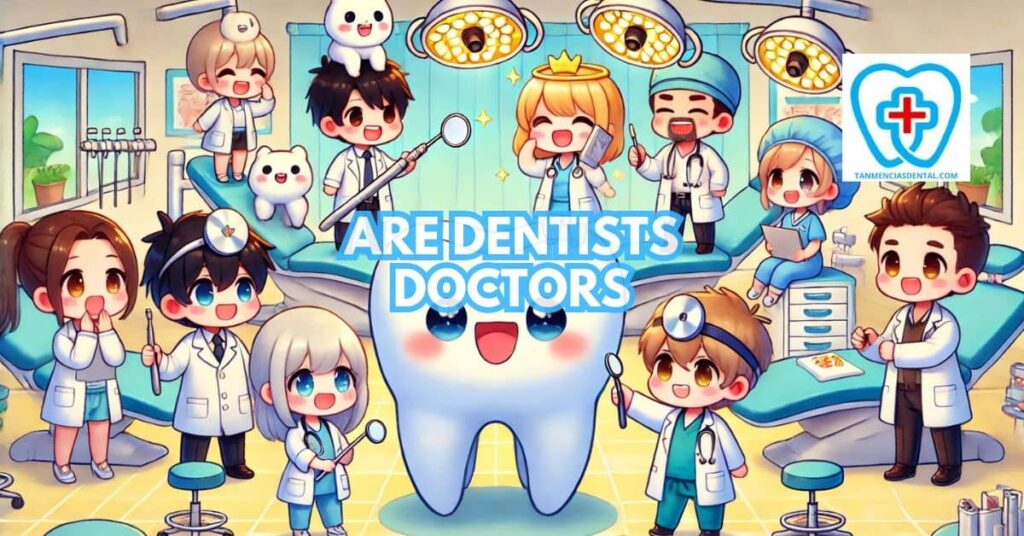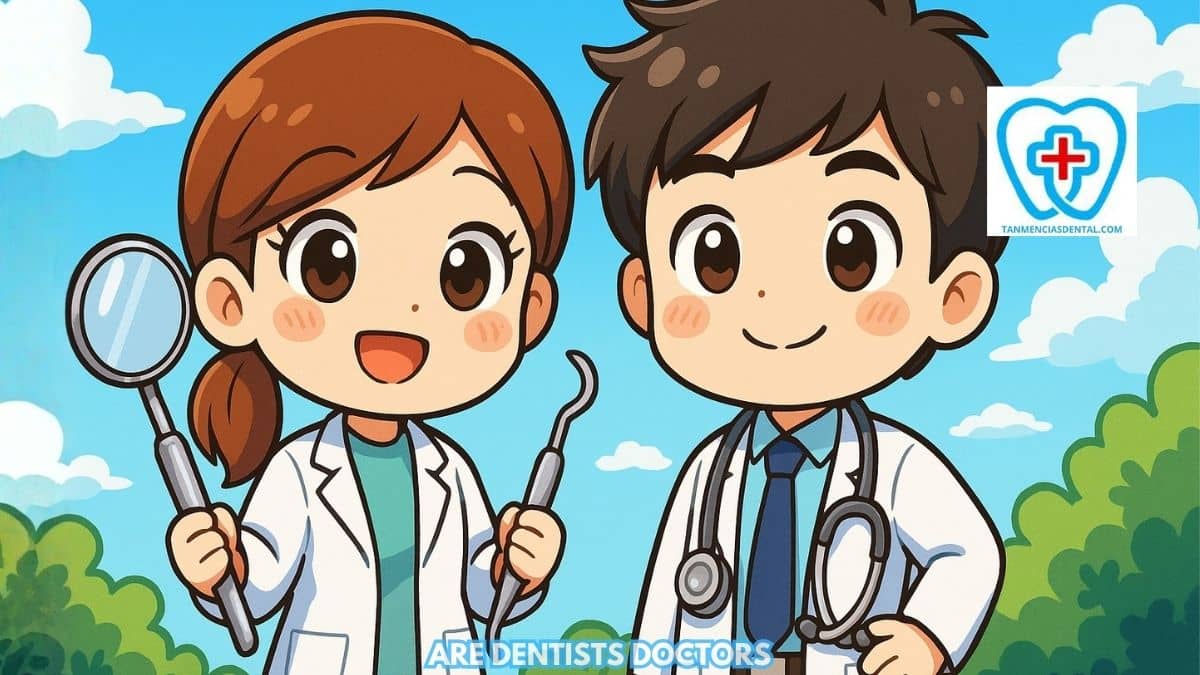The question “Are dentists doctors?” often comes up when people think about the meaning of the word “doctor.”
Many assume that only those who practice general medicine deserve the title, but this is not the case.
A doctor is someone who has completed an advanced level of study and training in a specific professional field.
Dentists, who earn the Doctor of Dental Medicine (DMD) degree, meet this standard through years of education and clinical experience.
We’ll explain how dentists in the Philippines qualify for the title of doctor and why recognizing them as such is important in understanding their role in healthcare.
1. Doctor vs. Dentist: Defining the Terms
Doctors and dentists both complete advanced education and training, but they focus on different parts of healthcare.
Medical doctors study the entire human body and usually hold an MD, while dentists in the Philippines earn a DMD, or Doctor of Dental Medicine.
Both paths require many years of study and hands-on clinical experience before one can practice professionally.
Dentists and medical doctors share the goal of diagnosing, treating, and preventing diseases, although their areas of specialization differ.
Dentists are doctors who focus on oral health, treating problems that affect the teeth, gums, and mouth.
Their training allows them to identify signs of disease that can also affect general health.
The education and clinical experience of both professions are equally demanding and essential to patient care.
The main difference lies not in importance but in the specific body systems they are trained to understand and treat.
🦷 Can Tooth Decay Spread to Other Teeth?
2. MD vs. DMD/DDS: Understanding Doctoral Degrees in Dentistry
The Doctor of Dental Medicine (DMD) is the dental degree required to practice dentistry in the Philippines.
It is equivalent to the Doctor of Dental Surgery (DDS) used in other countries, with the difference found only in name and not in the level of education.
Both degrees involve years of study and clinical training that prepare students to diagnose, treat, and manage oral health problems.
While an MD, or Doctor of Medicine, focuses on overall human health, a DMD centers on the structures and functions of the mouth and jaw.
Another professional path in medicine is the Doctor of Osteopathic Medicine, which also trains doctors to treat patients but includes a focus on the body’s musculoskeletal system.
All these degrees require rigorous academic work, hands-on patient care, and national licensure before graduates can practice.
The DMD and DDS programs teach students preventive care, restorative treatments, and surgical procedures involving oral tissues.
This shows that both medical doctors and dentists reach the same doctoral level of education, each serving a distinct but equally important role in healthcare.
🦷 How Do Dentists Remove Braces Safely and Effectively?
3. The Road to Becoming a Dentist: Education and Training in the Philippines
In the Philippines, becoming a dentist requires completing a six-year Doctor of Dental Medicine (DMD) program approved by the Commission on Higher Education (CHED).
The first two years are focused on undergraduate education and general science courses that give students a strong academic foundation.
These years are often called the pre-dental stage and include subjects such as biology, chemistry, and psychology.
The next two years involve learning basic medical and dental sciences, including anatomy, physiology, and pathology.
During the final two years, students move into clinical training and internship, where they gain hands-on experience by treating patients under supervision.
After finishing the program, graduates must pass the Dentist Licensure Examination (DLE) administered by the Professional Regulation Commission (PRC).
This long and thorough process ensures that Filipino dentists develop the knowledge, technical skills, and ethical responsibility needed to provide safe and effective oral healthcare.
🦷 How Often Should You Get Routine Checkups At The Dentist?
4. Understanding What Dentists Are Legally Allowed to Do
Dentists in the Philippines have a clearly defined scope of practice that outlines what they are legally permitted to do in their profession.
They have the authority to diagnose and treat conditions that affect the teeth, gums, and other parts of the mouth.
As part of their duties, dentists can prescribe antibiotics, pain relievers, and other medicines needed to manage oral health problems.
They are also qualified to perform dental surgeries, such as tooth extractions, root canals, and treatments involving the jaw.
Dentists can request and interpret dental X-rays to properly identify and treat oral diseases.
However, their scope of practice does not include treating illnesses in other parts of the body, as those fall under the care of medical doctors.
🦷 How Do Dentists Remove Tartar Buildup Effectively?

5. Science Behind the Smile: The Knowledge Base of Dentists
Dentists require a deep understanding of several scientific fields to properly diagnose and treat oral health conditions.
Their education includes studying anatomy (especially of the head, neck, and jaw), microbiology (to understand infections), pharmacology (to prescribe medications safely), and pathology (to identify abnormalities like oral cancer).
This strong scientific foundation equips dentists to manage both common and complex oral health issues, ensuring patients receive comprehensive and safe care.
🦷 How to Choose the Best Dental Care Center for Your Family
6. Dental School vs. Medical School: Similarities and Differences
Both dental and medical schools emphasize a strong foundation in the health sciences.
During the early years, students in both programs study anatomy, biochemistry, and physiology.
As training progresses, medical students specialize in broader bodily systems, while dental students focus exclusively on the oral cavity, head, and neck.
Clinical practice is central to both, with students working directly with patients under supervision.
Despite differences in focus, both schools ensure that graduates are competent healthcare providers in their respective areas.
🦷 Building Community Partnerships through Dental Checkup Camps
7. Beyond Checkups and Cleanings: The Scope of Dental Care
Dentists do much more than routine cleanings and checkups.
They diagnose and treat oral conditions such as tooth decay, gum disease, and infections.
They also perform procedures like root canals, extractions, crowns, and dental implants.
In addition, they provide preventive care, fluoride applications, sealants, and oral health education that help patients maintain lifelong oral wellness.
These diverse roles highlight dentists’ essential contribution to healthcare in the Philippines.
🦷 Best Mouthwash For Gingivitis: What to Look For and Avoid
8. Oral Health: A Cornerstone of Overall Well-Being
Oral health is closely connected to a person’s overall well-being because problems in the mouth can affect other parts of the body.
When the mouth is not properly cared for, bacteria can enter the bloodstream and may increase the risk of systemic conditions.
Studies have shown that poor oral hygiene can contribute to illnesses such as diabetes and cardiovascular disease.
These links show how oral care is more than just keeping teeth clean.
Regular dental checkups help detect signs of infection, inflammation, or disease before they worsen.
Dentists concentrate on oral health by preventing and treating problems that could also harm the body.
Good daily habits, such as brushing and flossing, play a major role in keeping both oral and general health in balance.
By maintaining oral hygiene and visiting the dentist regularly, people protect not only their smiles but also their entire body’s health.
🦷 How Long Is A Dentist Appointment?
9. Exploring Dental Specialties: Beyond General Dentistry
Like medical doctors, dentists can specialize in specific areas of their field.
In the Philippines, specialties recognized by the PRC and the Philippine Dental Association include:
Orthodontics – alignment of teeth and jaws
Periodontics – treatment of gum diseases and implant care
Oral and Maxillofacial Surgery – surgical treatment of the mouth, jaw, and facial structures
Endodontics – root canal and internal tooth treatment
Pediatric Dentistry, Prosthodontics, and others
These specialties require further years of study and training beyond the DMD degree, often in accredited institutions.
🦷 Is It Bad To Brush Your Teeth With Baking Soda?
10. Doctor or Dentist? Examining the Title Debate
The debate over whether dentists should be called “doctor” often arises from the traditional association of the title with medicine.
However, in the Philippines, dentists legally and ethically have the right to use the title “Doctor”, as recognized by the PRC’s Code of Ethics for Dentists.
They hold a doctoral-level professional degree, have the authority to diagnose, treat, and manage complex health conditions in their field, and play an integral role in public health.
The issue, therefore, is not about qualifications but about public perception and awareness.
🦷 Orthodontic Treatment in Marikina
11. Why Recognition Matters: The Value of the Doctor Title
The title “Doctor” represents both professional accomplishment and the trust given by patients.
For Filipino dentists, it reflects years of education, clinical experience, and dedication to improving public oral health.
Recognizing this achievement helps people understand that dentists are indeed doctors who play a vital role in healthcare.
Their work involves diagnosing, treating, and preventing oral diseases that can also affect general health.
This recognition strengthens the respect and confidence patients have in their care providers.
It also reminds the public that oral health is a key part of overall well-being, supported by professionals who have earned the right to be called doctors.
🦷 Trusted Dental Professionals at Tan-Mencias Clinic in Marikina
👨⚕️ Conclusion
Dentists in the Philippines are indeed doctors, professionals who have earned the Doctor of Dental Medicine (DMD) degree and undergone extensive education and training.
Their expertise extends beyond routine care to complex procedures that contribute to a person’s overall health and well-being.
They are legally recognized as doctors because of their authority to diagnose, treat, and manage oral health conditions under Philippine law.
Understanding their role helps the public appreciate that dentistry is an essential branch of healthcare, not a separate or lesser field.
By recognizing dentists as doctors, we affirm their dedication, competence, and vital role in protecting and improving the nation’s health.
❔ FAQs
1. Are dentists considered doctors in the Philippines?
Yes, dentists in the Philippines are legally recognized as doctors.
They earn the Doctor of Dental Medicine (DMD) degree after completing six years of education and training.
The Professional Regulation Commission (PRC) allows them to use the title “Doctor” because of their professional qualification and licensure.
2. What kind of training do dentists go through?
Dentists complete a six-year DMD program that includes general science courses, dental sciences, and clinical practice.
They study subjects such as anatomy, physiology, and pathology to understand oral and overall health.
After graduation, they must pass the Dentist Licensure Examination before practicing professionally.
3. Can dentists prescribe medicines in the Philippines?
Yes, dentists are authorized to prescribe medicines that relate to oral health conditions.
They can prescribe antibiotics, pain relievers, and other drugs needed for dental treatment.
However, they cannot prescribe medicines for illnesses that are not connected to the mouth or jaw.
4. How is a dentist different from a medical doctor?
A dentist focuses on oral health, treating diseases and conditions that affect the teeth, gums, and mouth.
A medical doctor, on the other hand, treats illnesses that affect the entire body.
Both are doctors, but each specializes in a different area of healthcare.
5. Why is it important to recognize dentists as doctors?
Recognizing dentists as doctors helps people understand their education, responsibilities, and contributions to health.
It also builds respect for the dental profession as an essential part of the healthcare system.
When dentists are properly recognized, it encourages more trust in dental care and overall health awareness.
😁 Self-Promotion
Visit Tan-Mencias Dental Clinic in Parang, Marikina City, where your smile is our priority.
Our friendly team is here to provide top-notch dental care in a welcoming environment.
For any questions or to book an appointment, feel free to contact us through our Facebook page, our website’s contact form, or give us a call at 0917-145-1074.
We’re ready to assist with all your dental needs.
Let us help you achieve a healthy, beautiful smile today!

